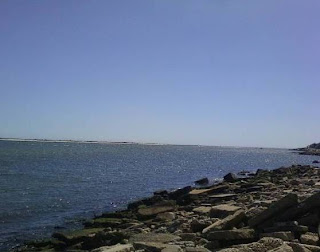Parisians
and psychotherapists disappear for the month of August. Sometimes I
think of myself as a Parisian in spirit,even though I haven't been in
eight years, but I have no illusions of being a psychotherapist. So
what's my excuse for being somewhat conspicuously absent this month?
Well, I've managed to be busy with other things, including writing projects. Hopefully they'll remunerate me; for now I find them rewarding. And, frankly, when I haven't been doing those things--or riding or playing with my cats--I've felt drained, spiritually and emotionally exhausted. The pastor of the church I started attending a few months ago says I'm healing. She's right.
Still, I've managed, in the past week, to ride to Point Lookout (Nothing like a few hours riding Arielle to make me feel lithe!) and to take a few shorter rides--and to record a few things along the way.
I'll start with something I saw on my way home from some volunteer work:
Sometimes I think archaeology is the step between destruction and forgetfulness. At least, that's how things seem to work in New York. Sometimes, when a building is torn down, a long-concealed sign, like the one in the photo, is revealed.
What particularly intrigued me was the bottom inscription: "Separate Waiting room for women." Talk about a relic! My undergraduate college went co-ed only four years before I enrolled in it. And, boys and girls entered my Catholic elementary school through separate entrances: a practice that was abandoned a couple of years after my family moved away.
Given that I lived as a male until ten years ago, it's hard for me not to wonder and imagine what my life would have been like had I entered through the girls' and women's doors. Of course, had I lived in such a world, I would not have attended the college from which I graduated. In fact, I might not have attended any college at all.
In those times, I probably would not have witnessed this:
The stretch of Brooklyn waterfront between the Brooklyn and Manhattan Bridges has been turned into a lovely park. Not long ago, it was off-limits, as the neighborhood around it--DUMBO--still consisted of functioning and recently-ceased manufacturing and warehousing. This stretch of waterfront, like so much of the rest of New York's shorelines, was used in various ways by those industries. In fact, most New Yorkers had little or no inclination to spend any time by the water, as it was associated with rough trades and characters. Fifth Avenue became Manhattan's most-desired address in part because, of all of the island's avenues, it is furthest from the East and Hudson Rivers.
Ah, but some things don't change:
That's one reason why I--and Arielle and, on occasion, Tosca--like to take a spin to Point Lookout.
Well, I've managed to be busy with other things, including writing projects. Hopefully they'll remunerate me; for now I find them rewarding. And, frankly, when I haven't been doing those things--or riding or playing with my cats--I've felt drained, spiritually and emotionally exhausted. The pastor of the church I started attending a few months ago says I'm healing. She's right.
Still, I've managed, in the past week, to ride to Point Lookout (Nothing like a few hours riding Arielle to make me feel lithe!) and to take a few shorter rides--and to record a few things along the way.
I'll start with something I saw on my way home from some volunteer work:
Sometimes I think archaeology is the step between destruction and forgetfulness. At least, that's how things seem to work in New York. Sometimes, when a building is torn down, a long-concealed sign, like the one in the photo, is revealed.
What particularly intrigued me was the bottom inscription: "Separate Waiting room for women." Talk about a relic! My undergraduate college went co-ed only four years before I enrolled in it. And, boys and girls entered my Catholic elementary school through separate entrances: a practice that was abandoned a couple of years after my family moved away.
Given that I lived as a male until ten years ago, it's hard for me not to wonder and imagine what my life would have been like had I entered through the girls' and women's doors. Of course, had I lived in such a world, I would not have attended the college from which I graduated. In fact, I might not have attended any college at all.
In those times, I probably would not have witnessed this:
The stretch of Brooklyn waterfront between the Brooklyn and Manhattan Bridges has been turned into a lovely park. Not long ago, it was off-limits, as the neighborhood around it--DUMBO--still consisted of functioning and recently-ceased manufacturing and warehousing. This stretch of waterfront, like so much of the rest of New York's shorelines, was used in various ways by those industries. In fact, most New Yorkers had little or no inclination to spend any time by the water, as it was associated with rough trades and characters. Fifth Avenue became Manhattan's most-desired address in part because, of all of the island's avenues, it is furthest from the East and Hudson Rivers.
Ah, but some things don't change:
That's one reason why I--and Arielle and, on occasion, Tosca--like to take a spin to Point Lookout.












